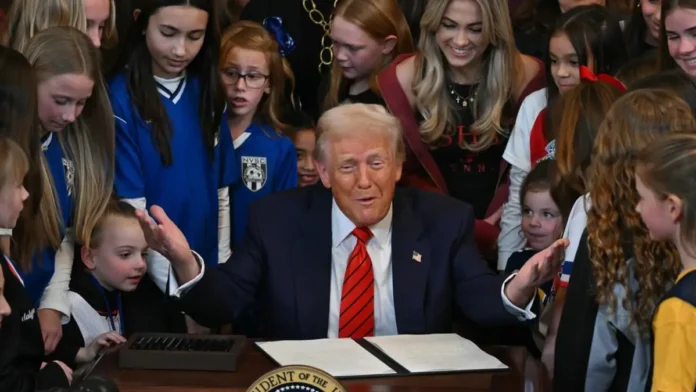Overview of the Executive Order
On February 5, 2025, President Donald Trump enacted an executive order named “Keeping Men Out of Women’s Sports,” which effectively bars transgender women and girls from competing in female sports at educational institutions and in international events, including the Olympics. This order stipulates that eligibility for sporting events should be based on biological sex rather than gender identity. Additionally, it instructs federal agencies to reassess their policies regarding transgender athletes and warns that federal funding may be revoked from institutions that fail to adhere to these guidelines
Implications for Educational Institutions
The executive order has significant implications for schools and colleges across the United States. By restricting Title IX’s application to biological sex, the order requires the Department of Education to enforce policies that prevent transgender women from competing in women’s sports. Educational institutions that fail to comply with these directives risk losing federal funding. This move reverses previous efforts to extend Title IX protections to include gender identity.
Impact on International Competitions and the Olympics
Beyond domestic sports, the executive order seeks to influence international competitions. It directs the Secretary of State and the Department of Homeland Security to review visa policies for transgender athletes and pressures the International Olympic Committee (IOC) to establish uniform rules excluding transgender women from women’s events. This initiative aims to prevent transgender athletes from participating in the 2028 Summer Olympics in Los Angeles.
Reactions and Criticisms
The executive order has elicited strong reactions from various groups. LGBTQ+ advocates argue that it discriminates against transgender individuals and undermines their rights. They contend that the order perpetuates harmful stereotypes and fails to consider scientific studies indicating that transgender women do not possess significant athletic advantages after undergoing hormone therapy. Conversely, supporters of the order assert that it is necessary to maintain fairness in women’s sports and protect opportunities for cisgender female athletes.
Legal Challenges and Future Outlook
The executive order is expected to face legal challenges from civil rights organizations and educational institutions. Critics argue that it violates constitutional protections against sex discrimination and conflicts with existing federal laws. The outcome of these legal battles will significantly influence the future of transgender participation in sports and the interpretation of Title IX protections.
Conclusion
President Trump’s executive order represents a pivotal moment in the ongoing debate over transgender inclusion in sports. By mandating that athletic participation be determined by biological sex, the order has far-reaching implications for educational institutions, international competitions, and the rights of transgender athletes. As legal challenges unfold, the balance between ensuring fairness in women’s sports and upholding the rights of transgender individuals will remain a contentious and closely watched issue.



